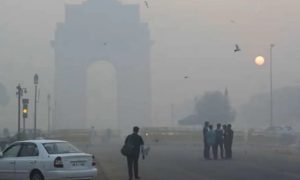On Tuesday, Delhi’s air quality deteriorated to 402, in the severe zone. On Monday, the average 24-hour AQI was 332, in the ‘very poor’ category. Senior IMD scientists said that with a western disturbance expected to impact Delhi and its neighbouring states from December 22.
Delhi continued to experience a high level of pollution as its air quality index (AQI) remained in the ‘very poor’ category on Wednesday morning. According to System of Air Quality and Weather Forecasting And Research (SAFAR), the national capital’s AQI was 385.
Noida, meanwhile, saw its air quality slipping to ‘critical’ category, with an AQI of 507, according to SAFAR. Other cities in the National Capital Region (NCR) also felt the experience of pollution, with Gurugram recording an AQI of 319 – categorised as ‘very poor’ according to SAFAR.
On Tuesday, Delhi’s air quality deteriorated to 402, in the severe zone. On Monday, the average 24-hour AQI was 332, in the ‘very poor’ category.
As per the government agencies, an AQI between zero and 50 is considered ‘good’, 51 and 100 ‘satisfactory’, 101 and 200 ‘moderate’, 201 and 300 ‘poor’, 301 and 400 ‘very poor’, and 401 and 500 ‘severe’.
Delhi environment minister Gopal Rai on Saturday informed that separate night patrols teams have been set up for each of the 11 districts of the national capital to monitor compliance to pollution control norms for construction-related activities.
The physical classes in Delhi school will resume for Class 5 and below from December 27 after being shut down for nearly a month because of air pollution.
The Commission for Air Quality Management (CAQM) in Delhi-NCR and adjoining areas had on Friday allowed schools and other educational institutions to be reopened in a phased manner.
Read More;- Zee-Sony merger gets approval from board; Sony to hold 50.86% stake in the merged entity
The decision was welcomed by school principals, parents and experts, who have rued how the long break in physical classes due to the Covid-19 pandemic, and the frequent closures after that because of pollution have not just impacted learning levels but even led to complaints of mental health problems among children.





































